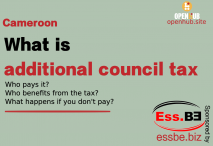After getting a review of the Cameroon tax system in our last post, let’s talk about the additional council tax that is conspicuously present in many taxes we pay. We are going to find out what the additional council tax in Cameroon is all about.
[rml_read_more]
This post is brought to you thanks to Ess.BE, a quality control management consultancy based in Douala – Cameroon. You can read more about Ess.BE
If this article helped you, you can support our work at OpenHub.
Support OpenHub DigitalMany people are unaware of what this tax is all about and what it is used for. Do you have to pay it? What will happen if you don’t pay it? Why do taxpayers in Cameroon pay the tax? I will share with you the answers to these questions below. We will also see how this tax is calculated.
What is additional council tax?
It is a local tax collected by the tax authorities on behalf of the councils. The tax is established on personal income tax, company tax and value added tax and the local councils benefit from it. Other local taxes include:
- Council taxes levies
- Regional taxes & levies
- Other levy provided for by law
How to calculate the additional council tax
The additional council tax rate in Cameroon is 10%. It is calculated on the principal and the tax increases which it is applied to. It also varies according to the components of the tax base. The assessment, issuance and collection of this local tax is done by the State’s taxation services.
Who benefits from the additional council tax?
As the name suggests, the tax is collected by the tax administration to the benefit of the council. According the General Tax Code of Cameroon, it “shall be distributed between the State and FEICOM, or any other body responsible for the centralization and equalization”.
- 70% of the tax collected is centralized and redistributed for the financing of city council, council and council union projects. The legislative body has put in place various criteria and conditions to regulate the distribution of the proceeds from the tax as well as other local taxes.
- 20% of the tax is allocated to the Special Fund for Mutual Assistance commonly known by its French acronym, FEICOM and the remaining
- 10% goes to the State as levying and collection fees
Who collects the additional council tax
It is collected by the customs and tax administrations on behalf of councils. The tax is deducted same time as the principal tax on which they are levied.
What happens if you don’t pay
Considering that the tax is levied on the principal of other taxes, the penalties that are paid on these other taxes automatically falls on it also. It is incorporated in the other taxes before it is collected. So there is no way a taxpayer will dodge away from it.
Exemptions
It should be noted that the property or land tax has been exempted from additional council tax. This means it shall no longer be collected on the land tax.
From Insight to Implementation
Going through the administrative and legal landscape in Cameroon requires more than just information—it requires a grounded local partner. At OpenHub Consulting, we specialize in helping the diaspora and international investors turn their business visions into compliant, operational realities.
If you are ready to move forward, our team is prepared to manage your registration and compliance from start to finish.
Start Your Company Incorporation →Discover more from OpenHub Digital
Subscribe to get the latest posts sent to your email.

